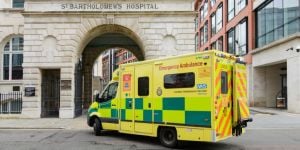
Since 1948, the UK has operated a publicly-funded healthcare system, the National Health Service (NHS). This initiative was born after World War II as part of a broader welfare reform aimed at eradicating unemployment, poverty, and illness while enhancing education. Healthcare in the UK is primarily funded through income tax, with approximately 18% of an individual's income tax contribution directed toward this purpose. Private healthcare is also available, sustained through acquiring private health insurance. However, it's worth noting that the private healthcare sector is still developing and not as prevalent as the public system in the UK.
The NHS in the UK
The NHS comprises the National Health Services (England), NHS Scotland, NHS Wales, and Health and Social Care in Northern Ireland. The NHS is British people's pride because it was funded when the country showed the world that it puts citizens' health and well-being over financial profit despite the post-war adversities. Before the creation of the NHS, healthcare was available to employed citizens, the wealthy, or those supported by charities. With the introduction of the NHS, everyone was and still is eligible for healthcare.
Overall, the NHS is an efficient, high-quality system that helps British people lead healthy lives through prevention and timely treatment. The NHS provides preventive services such as screenings, immunisations, maternity care, mental healthcare, rehabilitation (e.g., physiotherapy), palliative care, and clinically necessary dental and eye care. People who need assistive devices such as wheelchairs and hearing aids can access those via the NHS.
On the downside, public hospitals often lack modern equipment and medical staff due to limited funding. At the same time, people tend to use free medical services inconsiderately, burdening the system, which is weighted down with longer waiting times for specialist care and non-emergency surgery.
Good to know:
As of November 2022, the NHS in England stands as one of the world's largest employers, with approximately 1.26 million full-time equivalent staff. This is represented by 132,900 doctors, 350,600 nursing staff (including midwives and health visitors) and 36,600 managers.
Useful links:
Healthcare for different patient categories in the UK
The NHS is concerned with patients' individual needs and the type of care they need and strives to do its best for each individual with the means it has, which are often minimal.
For example, under the government's National Service Framework, people with long-term neurological conditions are considered for support to live an independent life and access medical specialists as close to home as possible. Also, older people are offered extended access to NHS services such as free sight tests, breast screenings for women, annual influenza immunisation, and increased access to dental care. Patients with terminal illnesses are given the option of home nursing instead of hospital care or staying at a nursing home. Lastly, disabled people can benefit from a Disability Living Allowance and Attendance Allowance, which offers help with personal care and mobility.
Private healthcare in the UK
Private healthcare services come at a premium charge, but they offer quicker referrals and more comprehensive one-to-one treatment in luxurious and modern facilities. However, in the UK, the private healthcare system is still gaining popularity. Some of the UK's most well-known private healthcare companies are BUPA, AVIVA (one of the largest insurance companies globally), the French AXA, and Medicare International.
Attention:
Even with private health insurance, you may still have to visit an NHS hospital for emergency services.
Good to know:
If you have landed a job in the UK, you may get private health insurance as part of your employment package. Contact your HR department for more information. Wealthier individuals purchase private insurance independently, irrespective of their employer.
Tip:
Find your expat health insurance for your stay in the UK via Expat.com. Have a look at each company's offers and decide depending on your and your family's needs. Get a free quote on Expat.com's health insurance for expatriates in the UK page.
Regional healthcare in the UK
As mentioned earlier, healthcare in the UK is managed at the national level, so it does not differ from region to region. The available healthcare facilities usually depend on where you live. In major cities and surrounding areas, you will find many public hospitals, dentists, drop-in centres, and general practitioners. There is always a GP and hospital near populated areas in the smaller towns and villages.
Good to know:
Add your postal code to the NHS's search tool to find the nearest healthcare facility.
COVID-19 in the UK
Despite the COVID-19 restrictions of social distancing having been lifted, COVID-19 remains a severe health risk, and people are advised to be cautious to protect themselves and others and prevent the spread of the virus. Thus, even though the government revoked the strict measures that were in place, people are still advised to stay at home and take a lateral test if they have any symptoms, and wash their hands regularly.
No vaccine is 100% effective. However, all COVID-19 vaccines should offer some degree of protection. Anyone living in the UK has the right to free vaccination against COVID-19 and treatment for COVID-19, despite their immigration status and right to (or not to) remain in the country. While it's advisable to be registered with a GP to access the vaccine against COVID-19, people who don't have an NHS number or GP registration are still entitled to free COVID-19 vaccinations. They can access walk-in vaccinations or book a vaccination appointment as unregistered patients through a local GP practice.
Good to know:
Get help from NHS 111 if you are worried about your COVID-19 symptoms and unsure what to do. In case of trouble with breathing, you can call 999 to get access to the A&E service.
Attention:
If you are 18 or older, book your COVID-19 vaccination appointment online via this link. Your vaccination will take place at a vaccination centre, a pharmacy, a hospital, or a GP surgery.
Useful links:
COVID-19 situation in your area
Book your COVID-19 vaccination (no immigration status is needed)
Healthcare for expats in the UK
Expats and their dependents with valid visas for at least six months can receive free medical care via the NHS. As part of your visa application, you must pay the Healthcare Surcharge with fees, depending on whether you are a student or a working professional. It costs £470 per year for a student and £624 per year for other visas.
New expats in the UK should register with a local General Practice (GP) to receive primary care before being referred to a specialist if needed. Anyone can register with a GP for free without showing proof of address or immigration status. However, you may be unable to register with the GP closest to your home because many practices have reached their capacity and cannot accept new registrations. Some areas have walk-in centres where you can show up anytime within the opening hours without an appointment or registration.
When you register with a GP, you can obtain an NHS number after you pass an interview, complete some paperwork, present your National Insurance number (usually obtained with the biometric residence permit), and demonstrate your residence. Upon completing these steps, your personal NHS number will be sent to you by post or online within a few days. An NHS number is a ten-digit number unique for each patient that helps NHS staff identify patients and match them to their health records. Note that having an NHS number does not mean you are entitled to free NHS services — you may still have to pay contributions towards the cost of prescriptions, dental care, eye care, etc.
Important:
A GP surgeon can reject adding you to their patient list if they have reached their capacity. If so, you must contact the Primary Care Trust in your area to find alternatives. If you need emergency medical help, you should head directly to the hospital.
Important:
You can access NHS services without an NHS number.
Useful links:
European Health Insurance Card in the UK
EU citizens used to be covered in the UK through their European Health Insurance Card (EHIC), and their health-related costs were charged following the same terms and conditions given to British nationals. Despite Brexit, if you have an EHIC, it will be valid until its expiration date is written on the card. But before it expires, you should start replacing it with a new variant: a UK EHIC or UK GHIC (Global Health Insurance Card). To apply for any of these cards, you must live in the UK legally.
The card allows you to access necessary medical healthcare, meaning you cannot postpone your care until you return to your home country. A healthcare provider decides whether your healthcare is medically necessary. Generally, emergencies and accidents, treatments for pre-existing conditions (e.g., chemotherapy), monitoring for pre-existing conditions, maternity care, and kidney dialysis fall under the necessary care category.
Good to know:
The Health Insurance Card is free of charge.
Attention:
The card is not a replacement for travel insurance since it may not cover all costs and repatriation costs.
Useful links:
European Health Insurance Card
Emergency numbers in the UK
You shall not contact the GP if you need urgent medical attention in the UK. Instead, go directly to the A&E of the local hospital or call the following emergency numbers:
- 999 for the police, ambulance services, fire brigade, or coastguard;
- 111 for urgent medical help via the phone before you are advised to come to the A&E or take some self-care steps.
Health insurance in the UK
If you need private health insurance in the United Kingdom, there are many insurance companies to choose from.
Some of the leading health insurance providers are:
Consider looking at their offers according to your needs and get a free quote on Expat.com's Health insurance for expatriates in the UK page.
We do our best to provide accurate and up to date information. However, if you have noticed any inaccuracies in this article, please let us know in the comments section below.












Comments
2This fascinating topic of Healthcare in the United Kingdom is so legit to know because I also saw very interesting companies working with these ***advertisement.